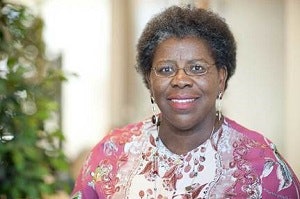Whether one’s academic supervisor is a White man or woman, or a person of color, the ability to say “no” to our supervisors is critical for one’s professional success and personal well-being. Some of us are incessantly asked to take on extra service, extra duties, to relieve someone else because they have “more important things” to do, and “just to do it” because it must be done and because we have that extra strength in our DNA, some seem to think.
Many years ago I was approached by an academic supervisor to chat about all the extra duties my supervisor wanted me to take on. Weeks before I had excitedly heard from a male colleague about my colleague’s promotion to the management or administrative ranks. Now, my supervisor wanted me to do the work under my colleague’s new job description, but without the (or any) title, without formal authority, and, definitely, without any increased pay. My supervisor just wanted the work done and thought I should do so, informally.
 Angela May Kupenda
Angela May KupendaI decided to respond with an email. The email I started to type was a quite angry email (yes, I would have been labeled the angry Black woman) that would have been loaded with typos, and would have been the antonym of professional and elegant!
Then before I pressed send, it occurred to me to “call a friend.” I called my sister, a top administrator and academic, who talked me down (it took hours!) and coached me to craft an appropriate “no.” I keep that email model to help me continually with all the “no” replies I have to give in order to be able to be a diligent and prepared teacher, a reliable and engaged community servant, and an excellent scholar. My sister taught me how to elegantly and professionally say no in an email in three easy paragraphs.
Paragraph one: give respect to the request and the importance of the work. This is almost always the case, as almost any academic project holds great promise and is sorely needed in our schools and larger society.
Paragraph two: acknowledge that you understand why they asked “you” (because you are so diligent, because of your past great service/teaching/scholarship in the area, etc.).
Paragraph three: decline definitively and politely.
Sometimes when I really, really believe in the mission behind the request, Paragraph three becomes, “While I must say no to your specific request because I am quite committed, what I can do is…” This way you get to help shape reasonable terms with which you can do extra to contribute.
My sister’s model is a more formal response, but it is quite similar to what I told one of my students several years ago. His academic work was suffering, because he was being pressed by his classmates to say yes to so many things. I told him, “Saying yes to yourself may often mean saying no to many requests.”
So as an addendum to the email model, each semester I suggest you prepare a one page document listing the many items to which you say “yes”: your scholarship projects, teaching, service, and other major commitments. Keep this on your computer, as sometimes you might choose to share with some making extra requests of you…just sometimes. Actually, one of my sister’s male supervisors taught her to do this one page document, and we modified it for my needs when I was being pressured to take on quite numerous, excessive tasks that would not have resulted in my professional or personal well being.
Saying no as an academic can still be quite difficult for me. Our work matters. Our students/alums/future students/community matter. Education matters. Further, having difficulty saying no is affected, I think, by gender/racial dynamics, people pleasing qualities I, for one, struggle with. BUT, I am doing better at saying “no.” As a result, my personal well-being has improved and I am more peaceful, more thoughtful and more engaged as a professional.
As a final reminder, when you do say “no,” remember to use it as you say “yes” to yourself, and say “no” with as much professionalism and as elegantly as you can muster. And if your no is unprofessional and full of typos, before you send it call a friend.
Angela Mae Kupenda is a professor at the Mississippi College School of Law.


















